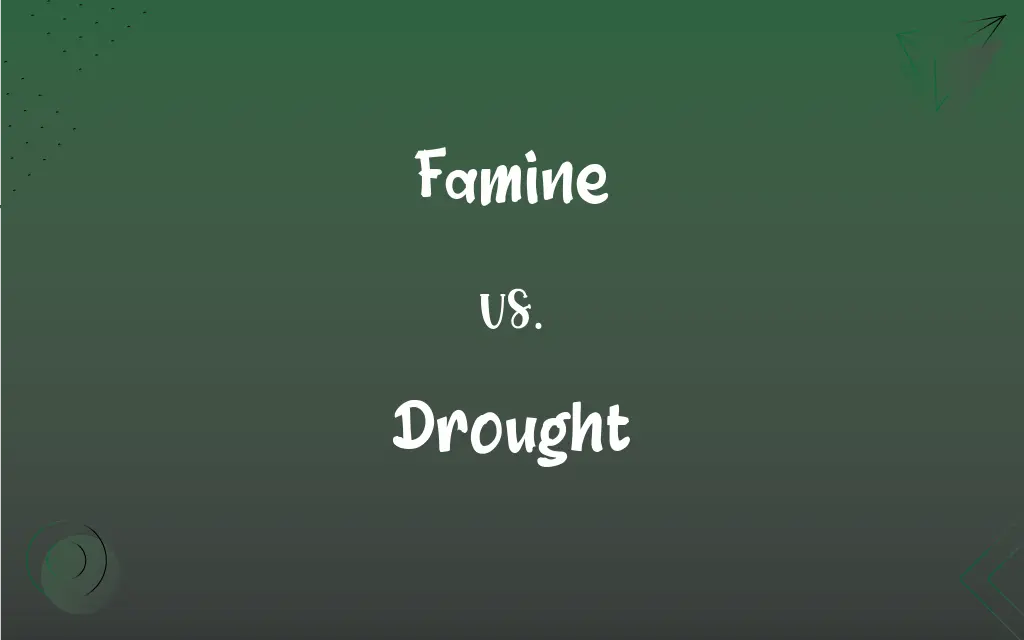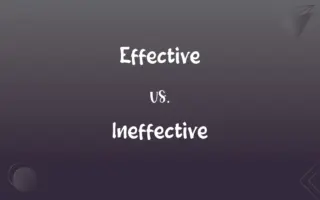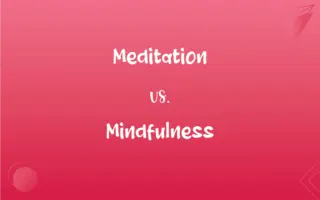Famine vs. Drought: What's the Difference?
Edited by Harlon Moss || By Janet White || Published on November 2, 2023
Famine is a severe scarcity of food causing widespread hunger, while drought is a prolonged period of abnormally low precipitation leading to a shortage of water.

Key Differences
Famine and drought are devastating phenomena but differ significantly in nature and impact. Famine is characterized by a widespread scarcity of food, leading to malnutrition and starvation in a large population. In contrast, drought is an extended period of deficient rainfall relative to the multi-year time-scale average for a region.
Famine typically results from multiple factors including poor agricultural practices, economic instability, or conflict, affecting food production and distribution. Drought, conversely, is primarily a natural phenomenon, usually arising from lack of adequate precipitation, which in turn, impacts water availability and can affect agricultural yield.
Severe drought can contribute to the onset of famine by affecting water supply and agricultural productivity, but famine can also occur independently of drought due to socio-economic and political factors. Thus, while drought can be a precursor to famine, not all famines are caused by droughts.
The implications of famine are primarily humanitarian, affecting health, livelihoods, and lives, demanding urgent relief and long-term solutions. The consequences of drought are environmental and economic, impacting ecosystems, water resources, and agricultural sectors, necessitating sustainable water management and conservation efforts.
Famine often requires international aid, policy interventions, and peacekeeping efforts for resolution. Mitigation of drought involves water conservation, efficient resource management, and development of drought-resistant agricultural practices.
ADVERTISEMENT
Comparison Chart
Nature
Severe scarcity of food causing widespread hunger.
Prolonged period of abnormally low precipitation.
Cause
Multi-factorial including poor agricultural practices, conflict, economic instability.
Natural, usually due to a lack of adequate precipitation.
Impact
Affects health, livelihoods, and lives.
Affects ecosystems, water resources, and agriculture.
Resolution
Requires international aid, policy interventions, and possibly peacekeeping efforts.
Requires sustainable water management and conservation.
Relation to Each Other
Can be caused by severe drought but can also occur independently.
Can be a contributing factor to famine.
ADVERTISEMENT
Famine and Drought Definitions
Famine
An extreme and generalized scarcity of food in a region.
The famine resulted in the loss of many lives due to starvation.
Drought
A long period of abnormally low rainfall, leading to a shortage of water.
The farmers are struggling with crop failure due to the severe drought.
Famine
A severe shortage of food causing a significant increase in mortality.
The international community is working together to provide relief to the areas affected by famine.
Drought
A prolonged absence of rainfall causing water scarcity.
The drought has led to a decline in the water level of the local reservoirs.
Famine
A widespread lack of access to food due to various reasons, leading to malnutrition and death.
The ongoing conflict has led to famine in the war-torn regions.
Drought
An enduring period of below-average precipitation resulting in extensive damage to ecosystems.
The prolonged drought has caused the death of many plant and animal species in the area.
Famine
A catastrophic food shortage affecting a large population over a considerable period.
The incessant drought has triggered a famine in the area, leaving thousands in need of food aid.
Drought
An extended time with less than average precipitation impacting water availability.
The region has been experiencing drought for the past three years, affecting water supply.
Famine
A disastrous scarcity of food leading to widespread suffering and death.
The famine was exacerbated by the failure of the government to act promptly.
Drought
A meteorological condition characterized by insufficient precipitation over an extended period.
The government is implementing water conservation measures to combat the effects of the drought.
Famine
A drastic, wide-reaching food shortage.
Drought
A long period of abnormally low rainfall, especially one that adversely affects growing or living conditions.
Famine
A drastic shortage; a dearth.
Drought
A prolonged dearth or shortage.
Famine
Severe hunger; starvation.
Drought
A period of unusually low rainfall, longer and more severe than a dry spell.
Famine
(Archaic) Extreme appetite.
Drought
A longer than expected term without success, particularly in sport.
Winning streak
Famine
(uncountable) Extreme shortage of food in a region.
Drought
(archaic) dryness, aridness, dry heat
Famine
(countable) A period of extreme shortage of food in a region.
Drought
Dryness; want of rain or of water; especially, such dryness of the weather as affects the earth, and prevents the growth of plants; aridity.
The drought of March hath pierced to the root.
In a drought the thirsty creatures cry.
Famine
(dated) Starvation or malnutrition.
Drought
Thirst; want of drink.
Famine
Severe shortage or lack of something.
Drought
Scarcity; lack.
A drought of Christian writers caused a dearth of all history.
Famine
General scarcity of food; dearth; a want of provisions; destitution.
There was a famine in the land.
Drought
A temporary shortage of rainfall
Famine
An acute insufficiency
Drought
A prolonged shortage
Famine
A severe shortage of food (as through crop failure) resulting in violent hunger and starvation and death
FAQs
Is famine a natural disaster?
Famine can result from natural disasters, but it is often exacerbated by socio-political factors, economic conditions, and conflict.
Are famines common today?
While not as prevalent as in the past, famines still occur, primarily in regions with political unrest and instability.
Does famine only relate to food scarcity?
Predominantly, but it often involves a combination of food, water, and essential services scarcity.
Does drought always lead to famine?
Not always, but severe drought can lead to food and water scarcity, potentially resulting in famine, especially in vulnerable areas.
What does famine mean?
Famine is a severe and extreme scarcity of food in a region, leading to widespread hunger and malnutrition.
What is a drought?
Drought is a prolonged period of inadequate rainfall relative to the multi-year, seasonal-average for a region.
Is drought a natural occurrence?
Yes, drought is a natural climatic phenomenon, but human activities can exacerbate its frequency and severity.
How long can droughts last?
Droughts can last for varying periods, from a few months to several years, depending on regional climatic conditions.
Does famine affect only humans?
Primarily, but it also affects animals due to a lack of food and water in the region.
Can famine occur without drought?
Yes, famine can occur due to various reasons like conflicts, economic instability, or crop diseases, independent of drought.
Can drought be predicted?
To some extent; meteorologists use climatic patterns to predict the likelihood of drought in a given region.
Are droughts only about lack of rain?
Predominantly, but they also involve aspects like high temperatures, leading to increased evaporation and water loss.
Can famine be resolved quickly?
It depends; addressing the underlying causes such as conflict and poor governance is crucial for a long-lasting solution.
Can human activities cause drought?
Yes, activities like deforestation and improper water management can contribute to the occurrence and severity of drought.
Does drought only affect arid regions?
While more common in arid regions, drought can occur in any area experiencing prolonged periods of below-average precipitation.
About Author
Written by
Janet WhiteJanet White has been an esteemed writer and blogger for Difference Wiki. Holding a Master's degree in Science and Medical Journalism from the prestigious Boston University, she has consistently demonstrated her expertise and passion for her field. When she's not immersed in her work, Janet relishes her time exercising, delving into a good book, and cherishing moments with friends and family.
Edited by
Harlon MossHarlon is a seasoned quality moderator and accomplished content writer for Difference Wiki. An alumnus of the prestigious University of California, he earned his degree in Computer Science. Leveraging his academic background, Harlon brings a meticulous and informed perspective to his work, ensuring content accuracy and excellence.







































































